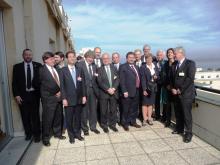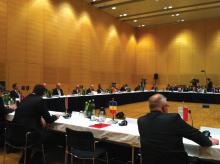A year since committing to reduce congestion for all in its Traffic Manifesto, TomTom today launches the world's first Traffic Foundation dedicated to fostering collaboration and nurturing talent in the field of traffic management.
A year since committing to reduce congestion for all in its Traffic Manifesto, 3972 TomTom today launches the world’s first Traffic Foundation dedicated to fostering collaboration and nurturing talent in the field of traffic management.
The not-for-profit TomTom International Traffic Foundation will bring together key stakeholders from academia, industry and policy-making with the aim to help reduce traffic congestion. The Foundation will nurture talent in the field of traffic management, funding PhD and post-doctorate research, publishing research papers and hosting a number of traffic-related events.
"The launch of the TomTom International Traffic Foundation is an important step towards our goal of reducing congestion for all, as set out in our Traffic Manifesto," says Harold Goddijn, chief executive officer of TomTom. "Traffic is a universal issue that impacts the individual, business and society as a whole. The Foundation will bring together the best global thinkers to look at traffic management from every angle."
The TomTom International Traffic Foundation will fund two PhDs and two post-Doctorate research projects annually into Traffic Management and Knowledge Technology. Successful candidates will be selected on a case-by-case basis. The research topics for 2012 will be:
Engineering models for traffic management
Vehicle-to-vehicle or vehicle-to-server communication
Physics of transport and traffic
2012 will also see TomTom fund research into a topic that aligns with the EU policy on Transport: ‘Creating standards in the field of road transport’ at European level. This relates to the EU Directive 2010/40/EU on the framework for the deployment of Intelligent Transport Systems in the field of road transport and for interfaces with other modes of transport.
In September 2010 TomTom outlined 20 actions points that would contribute to traffic congestion reduction globally. For an update on its progress over the last 12 months, click this %$Linker:External 0 0 0 oLinkExternal link Tom Tom false http://www.tomtom.com/landing_pages/trafficmanifesto/index-project.php?Lid=4 false false %>.
The not-for-profit TomTom International Traffic Foundation will bring together key stakeholders from academia, industry and policy-making with the aim to help reduce traffic congestion. The Foundation will nurture talent in the field of traffic management, funding PhD and post-doctorate research, publishing research papers and hosting a number of traffic-related events.
"The launch of the TomTom International Traffic Foundation is an important step towards our goal of reducing congestion for all, as set out in our Traffic Manifesto," says Harold Goddijn, chief executive officer of TomTom. "Traffic is a universal issue that impacts the individual, business and society as a whole. The Foundation will bring together the best global thinkers to look at traffic management from every angle."
The TomTom International Traffic Foundation will fund two PhDs and two post-Doctorate research projects annually into Traffic Management and Knowledge Technology. Successful candidates will be selected on a case-by-case basis. The research topics for 2012 will be:
Engineering models for traffic management
Vehicle-to-vehicle or vehicle-to-server communication
Physics of transport and traffic
2012 will also see TomTom fund research into a topic that aligns with the EU policy on Transport: ‘Creating standards in the field of road transport’ at European level. This relates to the EU Directive 2010/40/EU on the framework for the deployment of Intelligent Transport Systems in the field of road transport and for interfaces with other modes of transport.
In September 2010 TomTom outlined 20 actions points that would contribute to traffic congestion reduction globally. For an update on its progress over the last 12 months, click this %$Linker:







